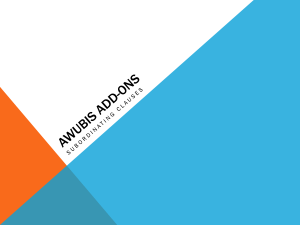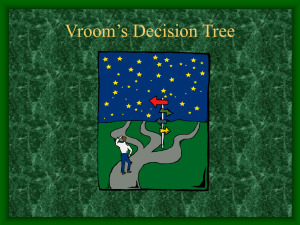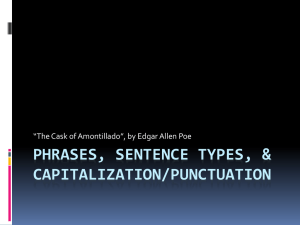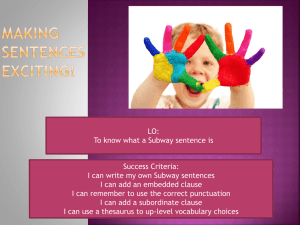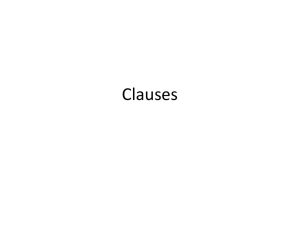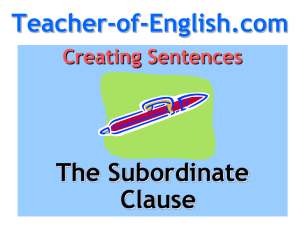The Complex Sentence
advertisement
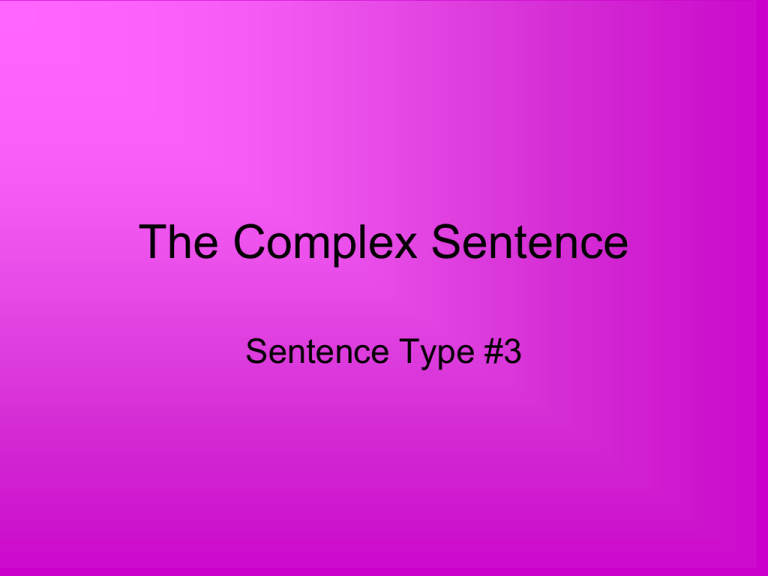
The Complex Sentence Sentence Type #3 What Is a Clause? A simple sentence is called an INDEPENDENT CLAUSE. A compound sentence is TWO INDEPENDENT CLAUSES separated by? A comma first and then a F.A.N.B.O.Y.S. (for, and, nor, but, or, yet, so) conjunction. A complex sentence has ONE INDEPENDENT CLAUSE and ONE DEPENDENT or SUBORDINATE CLAUSE. What Does Subordinate/Dependent Mean? If you are subordinate to the teacher, what does that mean you are? If I am subordinate to Mr. Pauley, what does that mean I am? If one idea is subordinate to another, what does that mean? Subordinate = secondary, lesser, inferior, or minor – all things subordinate are under a higher authority. If you are dependent on your parents, you are? Needy, reliant, dependent So What Does a Complex Sentence Look Like? Although she is very talented, she will not win the contest. Although she is very talented = subordinate/dependent clause She will not win the contest. = independent clause/simple sentence Which word is the subordinate conjunction? Although Which Is Independent and Which Is Subordinate? I like the kitten with the stripes even though he seems like the rowdiest, craziest one. I like the kitten with the stripes = independent clause/simple sentence Even though he seems like the rowdiest, crazy one = subordinate/dependent clause Which word is the subordinate conjunction? Even though Let’s Try One More: When he had finished his dinner, he cleaned up his plate, put it in the dishwasher, and wiped off the table. When he had finished his dinner = subordinate/dependent clause he cleaned up his plate, put it in the dishwasher, and wiped off the table = independent/simple sentence Which word is the subordinate conjunction? When Subordinate Conjunctions A subordinate clause contains a subject and a verb. The subordinate clause can be an adverb clause which begins with one of the following subordinate conjunctions: • After before until • Although if when • As in order that whenever • As if since where • As though so that wherever • As long as than while • As soon as though even though • because unless Or an adjective clause, acting as a description, beginning with: • That which who whom whose Or a noun clause, acting as a simple subject or direct object, beginning with: • What whatever whichever whoever whomever • That which who whom whose • How whether when where why So What about Commas? Look at the following complex sentences and you figure out the comma rule: As long as we get to sit together, I am happy to go to the play. I am happy to go to the play as long as we get to sit together. My dog will not leave the yard unless I tell him to. Unless I tell him to, my dog will not leave the yard. So What Is the Comma Rule for Complex Sentences? If the subordinate clause/dependent clause starts the sentence, place a comma after it. If the independent clause/simple sentence starts the sentence, do not use a comma. So Let’s See the Commas Again As long as we get to sit together, I am happy to go to the play. I am happy to go to the play as long as we get to sit together. My dog will not leave the yard unless I tell him to. Unless I tell him to, my dog will not leave the yard. Rule: If the subordinate clause/dependent clause starts the sentence, place a comma after. If the independent clause comes first, no commas. How about a compoundcomplex sentence? • As you may suspect, the last sentence type is a combination of a compound sentence and a complex sentence. • Example: • After I opened the letter from UF, I was so excited, and immediately I knew that my college decision was made! A Few More Examples: • He told me who stole my bike but I didn’t believe him! • Publix is an excellent company and because my dad is already a manager there I hope to get a job there too. • Since you have not paid me back I do not want to lend you anymore money but if you pay me back the first loan I’ll think about it. Let’s Practice Identifying & Punctuating Sentences!
